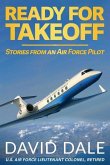In the chaotic days following the fall of the Soviet Union, Glenn Bever found himself in a very foreign environment where he had to connect and work with those who until recently had been regarded as adversaries. As the U.S. on-site engineer for a unique flight research program in Russia, his mission was to resurrect, instrument, and conduct a series of research flights on a retired TU-144 supersonic transport-an early competitor of the Anglo/French Concorde. These are his personal recollections of breaking the culture and language barriers in the aftermath of the Cold War to help bring about a successful flight research program with a collaboration that had never been done before.
Hinweis: Dieser Artikel kann nur an eine deutsche Lieferadresse ausgeliefert werden.
Hinweis: Dieser Artikel kann nur an eine deutsche Lieferadresse ausgeliefert werden.








